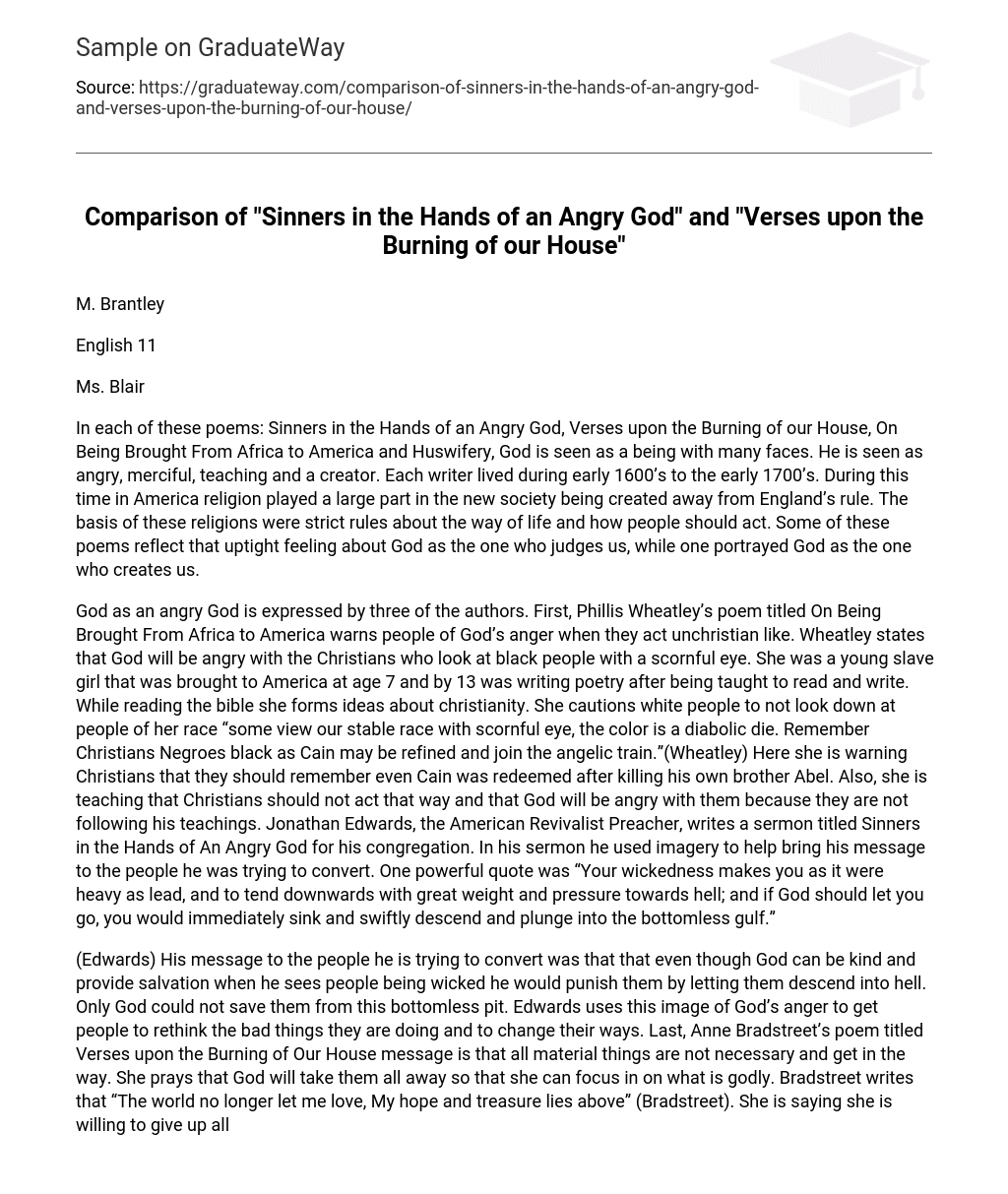M. Brantley
English 11
Ms. Blair
In each of these poems: Sinners in the Hands of an Angry God, Verses upon the Burning of our House, On Being Brought From Africa to America and Huswifery, God is seen as a being with many faces. He is seen as angry, merciful, teaching and a creator. Each writer lived during early 1600’s to the early 1700’s. During this time in America religion played a large part in the new society being created away from England’s rule. The basis of these religions were strict rules about the way of life and how people should act. Some of these poems reflect that uptight feeling about God as the one who judges us, while one portrayed God as the one who creates us.
God as an angry God is expressed by three of the authors. First, Phillis Wheatley’s poem titled On Being Brought From Africa to America warns people of God’s anger when they act unchristian like. Wheatley states that God will be angry with the Christians who look at black people with a scornful eye. She was a young slave girl that was brought to America at age 7 and by 13 was writing poetry after being taught to read and write. While reading the bible she forms ideas about christianity. She cautions white people to not look down at people of her race “some view our stable race with scornful eye, the color is a diabolic die. Remember Christians Negroes black as Cain may be refined and join the angelic train.”(Wheatley) Here she is warning Christians that they should remember even Cain was redeemed after killing his own brother Abel. Also, she is teaching that Christians should not act that way and that God will be angry with them because they are not following his teachings. Jonathan Edwards, the American Revivalist Preacher, writes a sermon titled Sinners in the Hands of An Angry God for his congregation. In his sermon he used imagery to help bring his message to the people he was trying to convert. One powerful quote was “Your wickedness makes you as it were heavy as lead, and to tend downwards with great weight and pressure towards hell; and if God should let you go, you would immediately sink and swiftly descend and plunge into the bottomless gulf.”
(Edwards) His message to the people he is trying to convert was that that even though God can be kind and provide salvation when he sees people being wicked he would punish them by letting them descend into hell. Only God could not save them from this bottomless pit. Edwards uses this image of God’s anger to get people to rethink the bad things they are doing and to change their ways. Last, Anne Bradstreet’s poem titled Verses upon the Burning of Our House message is that all material things are not necessary and get in the way. She prays that God will take them all away so that she can focus in on what is godly. Bradstreet writes that “The world no longer let me love, My hope and treasure lies above” (Bradstreet). She is saying she is willing to give up all she loves on this earth including her home for the valuable thing of Heaven.
In contrast to all the poems where God is violent or is one that takes things from us is the poem “Huswifery” by Edward Taylor. In this poem God is described like a spinner who weaves himself through our life. The threads are God making us into a beautiful cloth. Taylor describes the way God works in your life, “Make me thy Loom then, knit therein this Twine” (Taylor) Seeing God as a spinner makes you feel peaceful. The movement of spinning is quiet, calming and in the end you have something beautiful. Only this poem left the feeling and view of God as peaceful and merciful.
God has many faces to different people. Each of these poems shows how the author believed God to be present in their lives. Wheatley, Edwards and Bradstreet saw him in a much more forceful way Taylor wrote about in a gentler way. He created the image of God weaving his ways through the very fabric of our lives and who we are.





